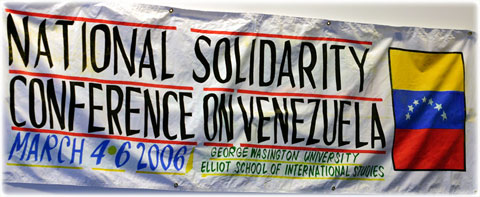Entered into the database on Friday, March 10th, 2006 @ 19:54:39 MST
VOTE WITH YOUR DOLLARS ExxonMobil has been selected for boycott because of its apparent active
involvement in U.S. policy in the Middle East in general and Iraq in particular,
and its power to help change these policies. Campbell Soup, Carlson Companies (Radisson Hotels, TGI Friday's), Corning
Inc., Metlife, Novartis, Pfizer, Verizon, Wells Fargo and Wyeth are also selected
for boycott because these firms can influence ExxonMobil through board members
they share in common with ExxonMobil. When governments and/or corporations perpetrate gross injustice and war - or
do nothing to stop it - we, the people, must take action to end the violence
and exploitation. Through the power of information and boycott, Consumers For Peace
offers you a non-violent way, every day, to act on behalf of justice and peace.
Our focus is the Iraq War. We propose a boycott of ExxonMobil Corporation products and the products and
services of nine firms that are in a position to influence ExxonMobil through
its board of directors to achieve these goals: 1. Immediate withdrawal of all U.S. troops and mercenaries from Iraq; and
reparations for the loss of Iraqi lives and property. 2. Impeachment of George W. Bush; and criminal prosecution of executive branch
officials who have lied to congress about the war and/or have commited war
crimes and crimes
against humanity. ConsumersForPeace.org Goals A boycott of major corporations to accomplish such goals may seem unlikely
to succeed given the size of the firms involved. And, this is an unusual step
to reach such specific objectives. Further, we recognize the deep seriousness of action that can affect people's
livelihoods. Nevertheless, we feel compelled to undertake this step because of the continuing
failure of the U.S. Congress to (1) face up to the gross suffering and violations
of human rights being caused by the war and (2) respond to the growing dissatisfaction
with war among the American people. The boycott is appropriate because this
Congress appears to be most interested in satisfying the demands of major corporations.
Seeing The Light In addition to the specific goals just mentioned, the boycott intends to demonstrate
that: As the world reaches peak production of oil, ExxonMobil, other petroleum
companies and the U.S. government must understand that we will not tolerate
war for oil. Apart from the horrific suffering it causes, war is a hopeless
postponement of basic changes in the U.S. economy and society urgently needed
now. By its complicity in U.S. designs on Iraq and the Middle East, and its
fierce resistance to changing course on global warming, ExxonMobil stands
out as a leader in corporate irresponsibility. ("Ethical issue snapshots" of ExxonMobil- We insist on reversing impoverishment of the U.S. and Iraq that is resulting
from the war. We will not support the unconscionable exploitation of currently
impoverished people and people of color to provide recruits for the Iraq War.
And we will not tolerate the impressing of anyone into fighting to support
the global ambitions of ExxonMobil and other petroleum companies, noting that
the pricing policies of these firms are contributing to impoverishment here
and around the world. We seek to withdraw our economic support from ExxonMobil and redirect it
to CITGO and enterprises that are willing to behave as responsible energy
producers. Let's Try a Little Enlightened Corporate Democracy We have written to ExxonMobil, urging it to publicly endorse the goals of the
boycott and to engage its full lobbying force to achieve the goals. (ExxonMobil
reports spending $7.7 million on lobbying in 2004.) And, we have written to
the nine consumer products firms that have board members in common with ExxonMobil,
urging them to endorse the boycott goals and to persuade ExxonMobil to do so. Novartis is the only corporation to respond: See Novartis'
response (dated November 28, 2005) Ethical guidance is among the responsibilities of corporate board members,
and the U.N. Human Rights Commission notes that corporations have the obligation
to "promote, secure the fulfillment of, respect, ensure respect of and
protect human rights recognized in international as well as national law, including
the rights and interestes of indigenous peoples and other vulnerable groups." We have
provided a copy of our letter to Dr. Henry A. McKinnell Jr., Chairman and
CEO of Pfizer Inc., who sits on the ExxonMobil board of directors. You may wish
to use it as a sample in writing your own letter to him, other ExxonMobil board
members, or Lee Raymond, head of ExxonMobil. We have listed all the ExxonMobil
board members, with addresses. After Jan. 1, 2006, address your letters to Rex Tillerson, currently president
of ExxonMobil, who will replace Mr. Raymond as ExxonMobil's chair and CEO. ( Note: ExxonMobil, Pfizer and Novartis are among 220 companies, keen on doing
business in Iraq, that sent representatives to a "procurement" conference
in London in 2004 that was praised by a Novartis official as "the most
productive, practical and successful business event" in a series of "reconstruction
events" www.antiwar.com/ips/suri.php?articleid=2434
All three firms avow respect for human rights. Novartis is most specific: "Novartis
does not engage in or benefit from war crimes, crimes against humanity, genocide,
torture, forced disappearance, forced or compulsory labor, hostage-taking, other
violations of humanitarian law or other international crimes against the human
person as defined by international law.") 
A people's history of
the United States
www.ExxposeExxon.com/report.pdf
www.corpwatch.org
)
See
our reply to their response (dated December 21, 2005)
Novartis'
most recent reply (dated January 20, 2006)
www.globalpolicy.org